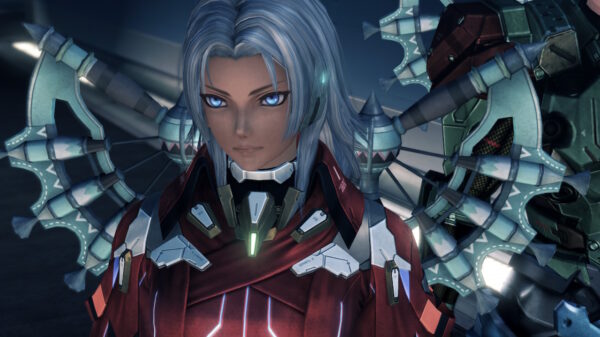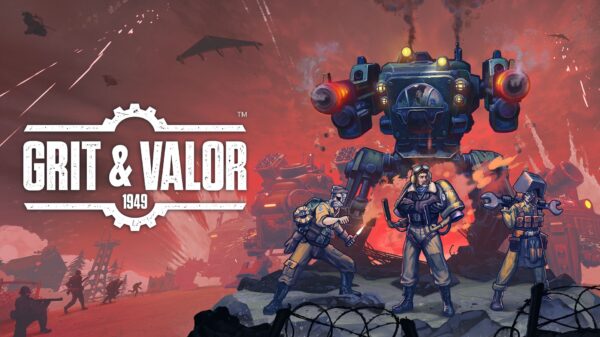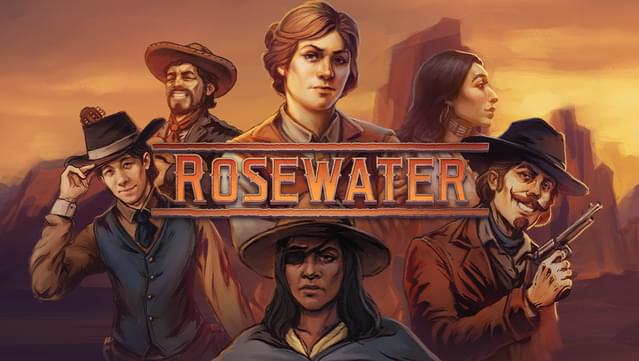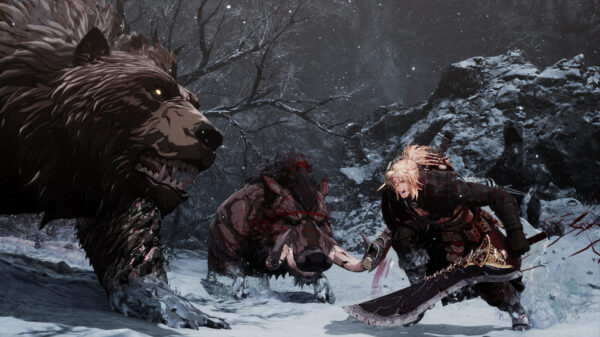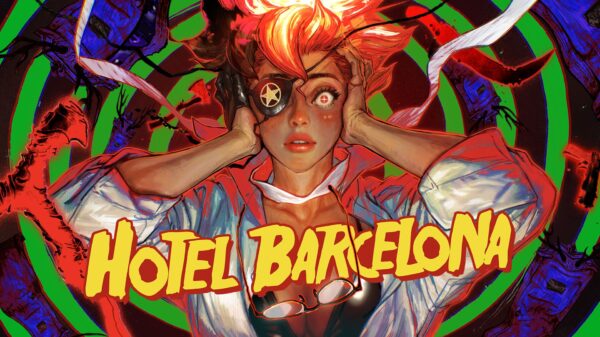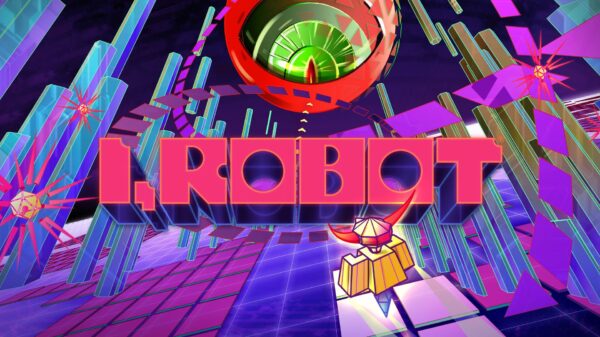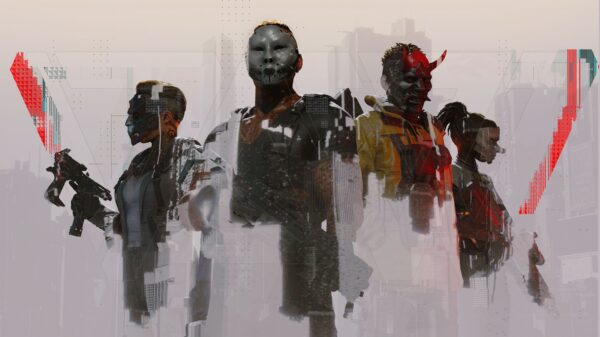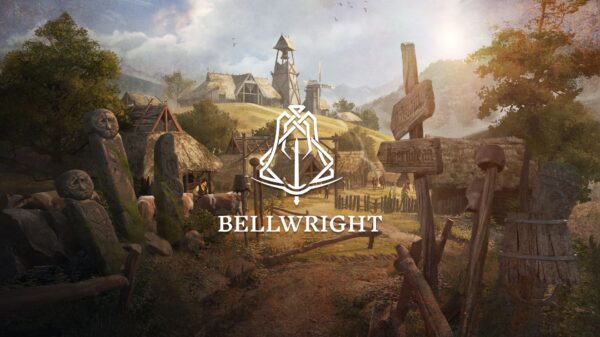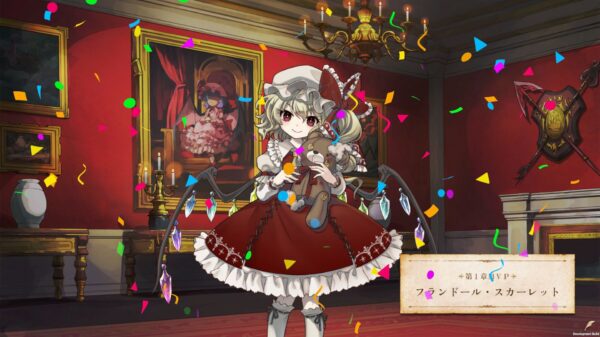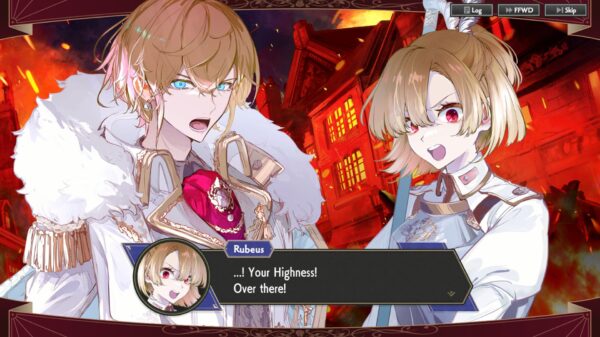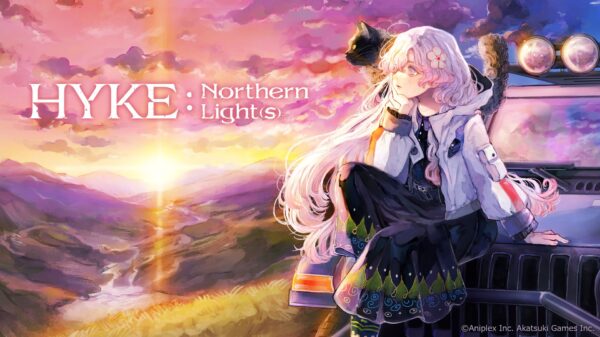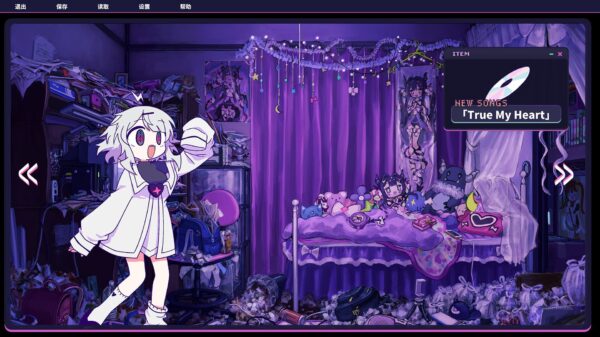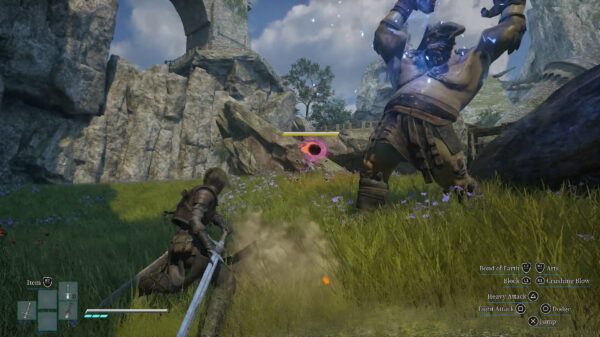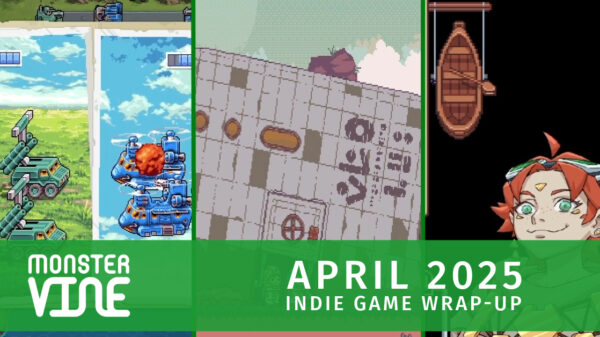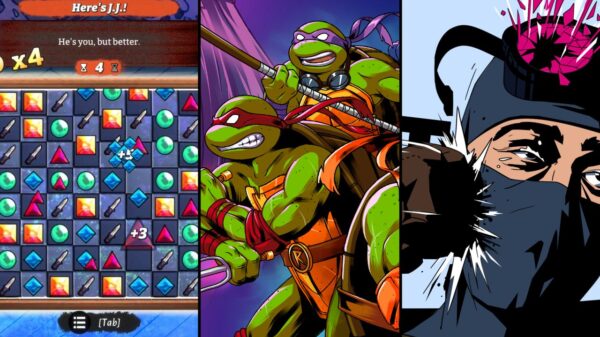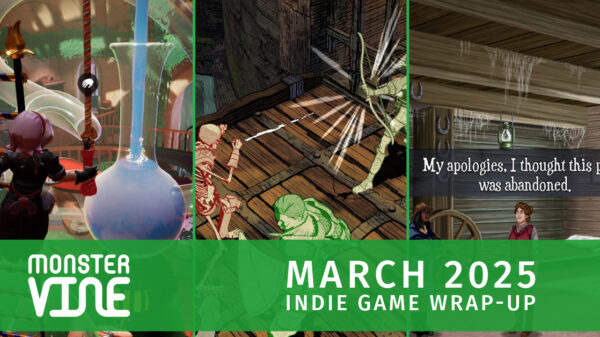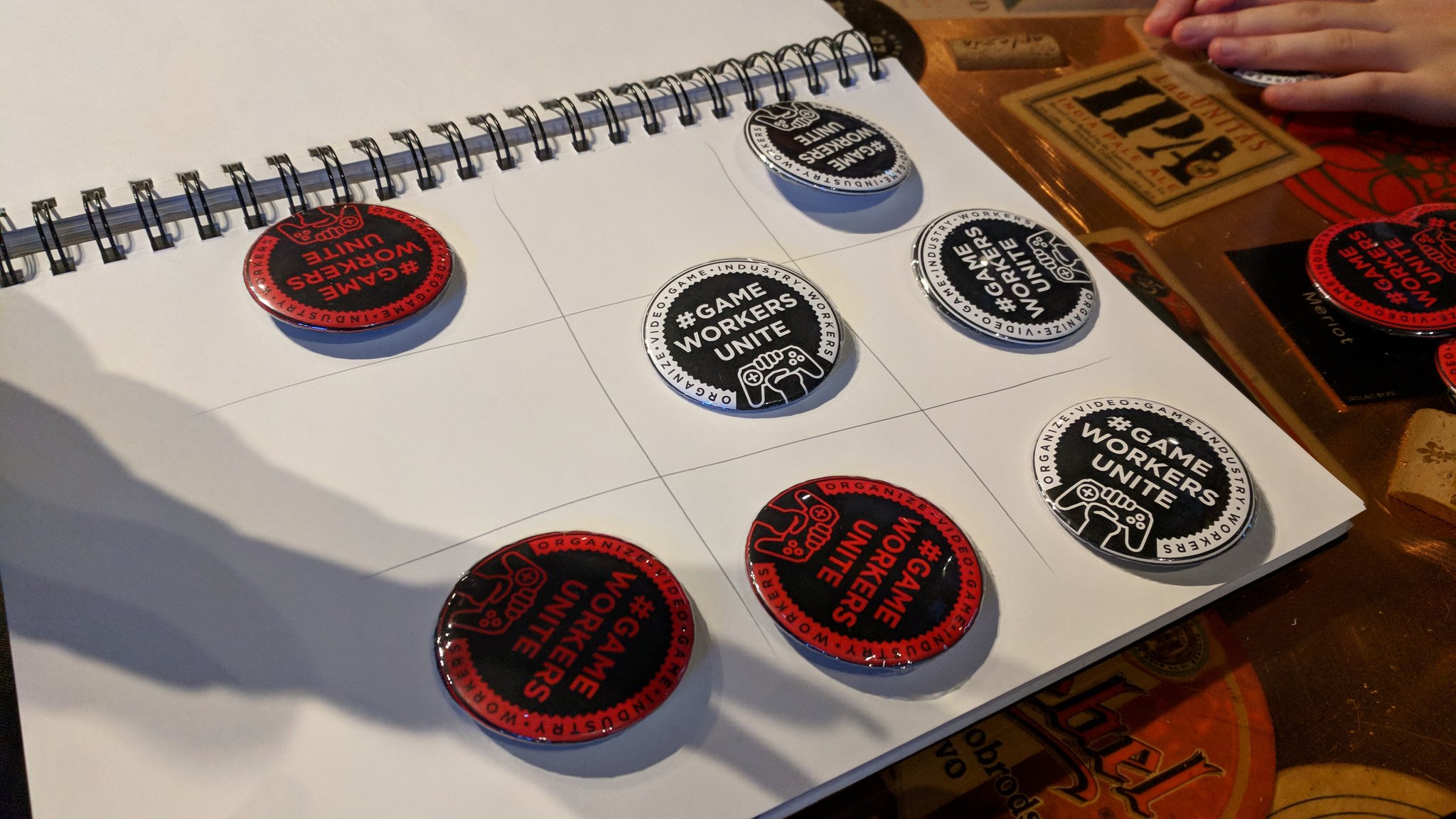Gamers like to think of the world of game development as a halcyon wonderland where dreams become reality and everyone gets rich being a lazy dev that just makes cash-in decisions. The truth of the matter is game developers work hard and tend to get laid off. Volatility remains a problem, as does “crunch time.” Likewise, recent flare-ups include ArenaNet firing two developers, one for behavior on social media and the other for defending his colleague, then doubling down on their behavior. The President of the Entertainment Software Association insists that everything is fine and crunch hasn’t been a significant issue in gaming for over a decade. On the other hand, the ESA represents the companies that make games, so their interest is getting people to buy more stuff their industry makes.
Who speaks for the game developers themselves?
The International Game Developer’s Association (IGDA) could, but their interest tiptoes around labor issues in favor of promoting the “Everything is Awesome” ethos that permeates the industry as a whole. Consider their Twitter feed: Currently there’s an HR Special Interest Group getting underway and a mention of “social media policies,” but it’s largely summarized as “How to break into this awesome industry and do awesome things.” When you get laid off for the fifth time in five years or fired because you got a little testy on your personal social media account, who is going to take up the cause?
Developers are starting to realize the answer is “nobody.” And so talk starts to percolate through the common workers of the gaming industry, the word management most dreads: union.
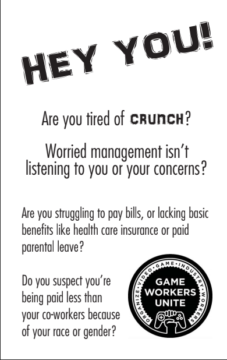
An anecdote from my time in the industry: I worked at a developer where people were finally getting sick of working 80 hours a week and being flogged for more by management. We started to talk about unionization. One guy got serious enough to talk to a labor attorney and some of the locals and really take care that they couldn’t fire him outright for union talk. (Technically, it’s illegal to fire you for discussing unions in the United States, but many savvy employers can just go “Oh, culture fit” and trust you won’t sue, because you’d never work in this town again).
So they bought him out: They talked to him and gave him enough money to pay full sticker for his Ph.D. and he bailed as fast as he could. Having been in the industry for close to a decade, the instant management thinks you’re serious about unionizing, “Everything is Awesome at our cutting-edge knowledge company where we’re all equals” swiftly switches to Walmart quality union-busting tactics.
Game Workers Unite is trying to change that by building a unionized gaming industry. I spoke with Felicia and Tim, two volunteer organizers from GWU’s Australian branch to see how they’re going about it. (Given the labor climate in the US, it was extremely difficult to find someone willing to go on the record).
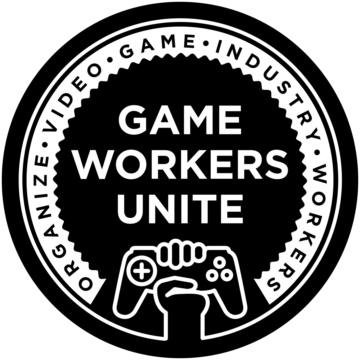
While Australian and US labo(u)r law is very different, there are some similarities in the two industries, Tim says. “The work in Australia is generally just as precarious as it is in the USA, because most game workers in Australia are in a contracting/freelancing position with no guarantee of ongoing work. Those workers who do manage to land the elusive, magical full-time job in games do have some rights and can’t simply be fired at-will like many workers in the US can. However, a large part of our focus has to be on providing assistance to freelancers/contractors, simply because they make up a huge portion of the workforce. Their needs are very different.”
Felicia added that, though challenging, it’s not as insurmountable as it seems. A union can work for freelancers–see The Freelancers Union in the United States–and provide benefits including health, dental, and other insurance benefits. “That’s a massive deal for someone who have little more guarantee than a client’s word,” she said.
I cited the president of the ESA’s claim that, essentially, everyone makes good money, and there’s low barriers to entry and exit (a polite way of saying it’s very easy to quit), so unionization isn’t really a thing that gaming needs to worry about. After all, even a hard-pressed developer isn’t a steel worker or something.
“Everyone’s on good wages? Absolutely not,” Felicia said, “All their rights covered? Nope. I definitely don’t agree with that, and I’ve worked in both the American gaming industry and the Australian industry. Putting aside that the American system is different to the Australian, unions don’t just cover money. They cover a wealth of other things. My personal experience covers a fair few companies, and they didn’t have good wages and their policies were appalling. In one company, just for an example, there was no sexual harassment policy at all.”
Indeed, as per the IGDA’s own Developer Satisfaction Survey, 14% of respondents said their company had no sexual harassment policy at all. 25% didn’t even know if their company had diversity or harassment policies. Of the companies that did have such policies, less than half had a formal complaint procedure or disciplinary process.
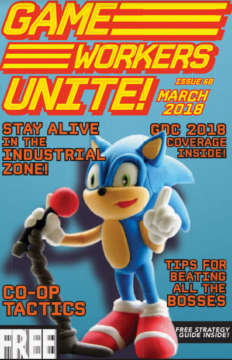
Felicia said this company in particular had existed for 17 years at that point, and “you cannot convince me that sexual harassment just didn’t happen during that time.” When she had to bring issues up, she had to do it alone, with no backing, in an office with 50 other workers. “If I had access to a union, I could’ve had a rep with me when I brought [them] up.” As a lack of this anonymity, “Everyone knew it was me that brought these issues up, and I had to deal with [it], alone. I think I have every right to not be harassed sexually at work, be paid a living wage, and have the backing of a collective instead of doing everything myself.”
Tim added that “game workers need to put aside this idea of some kind of, for lack of a better word, ‘aspirational labor’. Work is work.” Whether working on an oil rig or building a 3D model of an oil rig, he added, “You’re doing work, somebody is making money from your labor. You need to ask yourself whether you’re okay with being exploited just because your boss says other people have it worse than you do… or whether you’re going to stand up for yourself because you deserve a good life.”
I cited my own experience working in the industry and that a lot of the public-facing resistance comes from developers themselves, not just management. Tim said he hasn’t seen the textbook union-busting rhetoric down in Australia, but they’ve had pushback from people that work in games saying, “Unionization would threaten the growth of the industry and they’re simply ‘not in a strong enough position to be able to pay people…it’s all from the same song sheet and it’s to be expected.” Ultimately, he said, “It’s just not good enough to say that workers need to suffer so the industry can grow. That’s an appalling mindset.”
The lack of solidarity, Felicia added, “Burns me right up because we do it to ourselves. There’s no reason to say that someone shouldn’t be taken care of for the sake of a good video game. I shouldn’t have to be a ‘good person’ to want people to feed and clothe themselves. If you go in on a business with a mate and you both understand that you won’t be getting money for a while – that’s on you both. That’s an understanding you have. Once you step outside of that agreement and start including other people, that is where you need to realize you have a responsibility to others.”
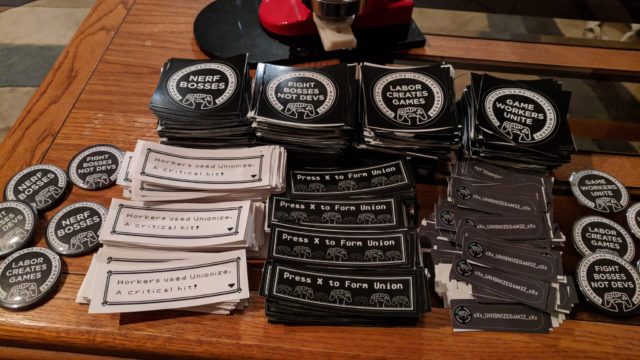
I cited the common thread I heard in my informal survey of developer friends and colleagues: unions don’t work anymore. Making video games isn’t like making cars. Who wants to give money to these big, corrupt organizations that don’t really do anything? Besides, the industry is massively successful as it is. Why change what works?
“Any place that takes on power is susceptible to corruption, that’s just how power works,” Felicia said. “However, unions are made up of workers, and…the United States’ situation is unique. Corruption around US unions and organized crime, for example, happened after companies used the mafia to beat up [union] workers who were on strike. That’s when the mafia realized they could make money through organized labor, so they infiltrated them.” Even as late as the 1970s, Mobil Oil was paying Mafia strikebreakers $14,000 per day. She added “I don’t see the industry as successful when companies still using up people like batteries until they’re completely burned out. The companies are successful, maybe, higher-ups pockets are being lined.”
Tim added that the rhetoric was the same in Australia. “Unions are constantly painted by big business as corrupt thugs who are a threat to our very way of life – even though every investigation into the supposed criminal behavior of unions evaporates, while our own banking sector was recently implicated in quite literally laundering money for terrorists and knowingly charging dead people money for financial advice! Our government has even tried to blame unions for rising house prices! So we are very used to this kind of rhetoric.” He added that the fact is, union members earn more than non-union members in the same industry, citing Australian government statistics. “That’s not ‘corruption’ and it’s not ‘thuggery,’” he said. “It’s simply workers standing together and fighting for a better deal.”
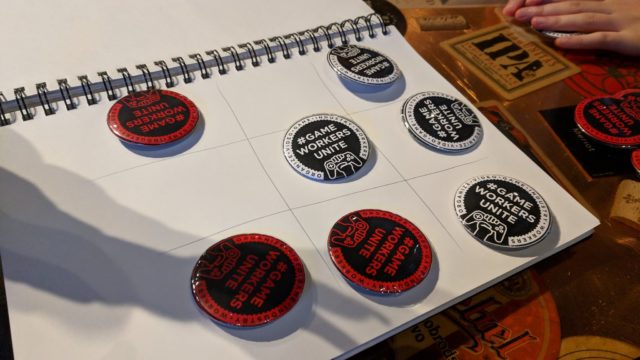
Okay, but what if I’m the average gamer? I asked. These people are complaining about their jobs–a job I would love to do, by the way!–when they should just shut up and make games. In fact, that’s the sentiment behind a lot of blowups between developers and fans: You’re doing this amazing job, so shut up and do it.
“If, and I would hope this isn’t the case, but if your readers only care about how good a game is and not the person making it, then they need to understand that the more an employee is taken care of, the more they can put into a product,” Felicia said. “Even if you don’t care at all about the people making your games (and you should), then you should at least be able to grasp that the more you put into someone, the better they will do.”
Tim added that gamers “need to be able to put themselves into the shoes of people making the games, and have some empathy when it comes to issues like working hours, crunch, overtime and so on…it’s not fair to expect other people to destroy their lives and tear apart their families just so you can enjoy a game by Christmas instead of waiting a few months.”
For those who want to get involved, be they workers or be they gamers and fans, Tim says the best thing to do right now is start the conversation. “Start talking to your friends and colleagues about what your issues are and what’s important to you. Join Game Workers Unite, start sharing resources, start learning what your rights are. Get in touch with local union officials and ask for help. Go to meetings if they’re happening near you. Get involved! The industry won’t fix itself, and the bosses sure aren’t going to fix it. It’s up to you and people like you to stand up and make the change.”
Felicia added that, “the more we work together, the better of a chance we have to change things. I mean that, you may feel alone and you may feel like you can’t do anything to change your situation. You can. This movement is built by people who are just like you.”

